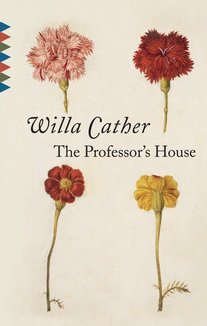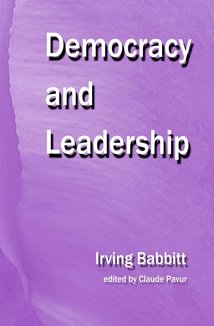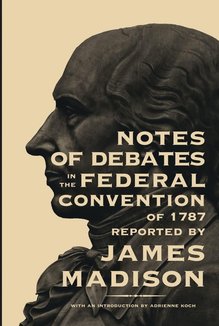Recommended Books

The Professor's House (Vintage Classics)
Author:
Willa Cather
ISBN 13:
978-0679731801
A lyrical and bittersweet novel of a middle-aged man losing control of his life that's a brilliant study in emotional dislocation and renewal —from one of the most highly acclaimed authors of the twentieth century. Professor Godfrey St. Peter is a man in his fifties who has devoted his life to his work, his wife, his garden, and his daughters, and achieved success with all of them. But when St. Peter is called on to move to a new, more comfortable house, something in him rebels. And although at first that rebellion consists of nothing more than mild resistance to his family's wishes, it imperceptibly comes to encompass the entire order of his life. The Professor's House combines a delightful grasp of the social and domestic rituals of a Midwestern university town in the 1920s with profound spiritual and psychological introspection.

Democracy and Leadership
Authors:
Irving Babbitt
,
Claude Pavur
ISBN 13:
979-8884358966
Babbitt (1865-1933) was one of the greatest teachers of the 20th century, with much to teach the 21st. This handily reformatted edition of his major work presents in full his classic analysis of the spiritual, religious, cultural, and political situation of late modernity. Original page numbers are retained in brackets. Footnotes are now numbered in a single sequence. New here is a compendium of memorable citations that will help the reader to recall many of the author's most important ideas and striking statements. After 100 years, Babbitt can still challenge and even astound readers with the range of his vision and the depth of his insights.

Notes of Debates in the Federal Convention of 1787
Authors:
James Madison
,
Adrienne Koch
ISBN 13:
978-0821407653
James Madison’s record of the Constitutional Convention traces day by day the debates held from May to September 1787 and presents the only complete picture we have of the strategy, interests, and ideas of the Founders at the convention itself. In this indispensable primary document, Madison not only provides detailed insights into one of the great events of US history, but clearly sets forth his own position on such issues as the balance of powers, the separation of functions, and the general role of the federal government. More than in Federalist, which shows the carefully formalized conclusions of his political thought, we see in Debates his philosophy in action, evolving in daily tension with the viewpoints of the other delegates. It is for this reason that Debates is invaluable for placing in perspective the incomplete records of such well-known figures as Rufus King and Alexander Hamilton, and the constitutional plans of such men as Edmund Randolph and Charles Pinckney. Madison’s contemporaries regarded him as the chief statesmen at the Philadelphia convention; in addition to this, his record outranks in importance all the other writings of the founders of the American republic. He is thus identified, as no other man is, with the making of the Constitution and the correct interpretation of the intentions of its drafters. New to this edition of Debates is a thorough, scholarly index of some two thousand entries.